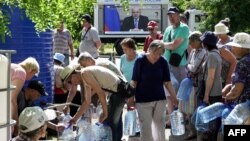One heavy rainstorm in the war-torn Ukrainian city of Mariupol could set off a cholera outbreak, scientists say.
Researchers who predicted a 2017 cholera outbreak in Yemen now say conditions are growing ripe in Mariupol.
The city is at elevated risk because water and sewage systems were damaged in the fighting.
As summer temperatures rise, conditions are growing more hospitable for the waterborne bacteria that cause the disease.
"All we need is a good rainstorm," University of Florida environmental engineering associate professor Antar Jutla told VOA. Jutla is one of the leaders of the cholera forecasting system.
Heavy rains would stir up bodies of water and boost bacteria levels, he said.
Jutla and his colleagues combine satellite imagery, air and water temperatures, and information about access to clean water to predict the risk of cholera outbreaks.
"We're not saying cholera is going to descend tomorrow on Mariupol," University of Maryland microbiologist Rita Colwell, another of the team's leaders, told VOA. "We're saying the risk is high and all the factors are there. Now is the time to prepare, not wait until you have thousands of cases."
Britain's Ministry of Defense tweeted a defense intelligence update Friday that said Russia was having trouble supplying to the occupied territories basics such as sanitation, safe drinking water and medical supplies. According to the update, there have been isolated cases of cholera already reported in the city.
Those reports reinforce comments an aide to Mariupol's mayor made earlier in the week on Ukranian television. Petro Andryushchenko said the humanitarian situation in Mariupol is getting worse every day. Decomposing garbage and corpses have contaminated drinking water, increasing the risk of a cholera outbreak, he said.
His specific claims could not be independently verified, but World Health Organization Regional Director for Europe Hans Kluge, speaking at a news briefing last month in Kyiv, issued a warning about the potential for a cholera outbreak in occupied areas, where water and sanitation infrastructure had been damaged or destroyed.
At that same briefing, WHO's emergencies coordinator for Europe described Mariupol's hygienic situation as "a huge hazard" and said WHO received "information that there are swamps actually in the streets, and the sewage water and drinking water are getting mixed."
Cholera is an extremely serious disease that is caused by eating food or drinking liquid that is contaminated with Vibrio cholerae bacteria, according to the WHO. It can cause severe acute watery diarrhea and severe dehydration. It affects both children and adults and can kill within hours if untreated.
Russian forces bombarded Mariupol for weeks, and Ukrainian officials estimate 90% of the city is destroyed.
VOA's Steve Baragona and Reuters contributed to this report.





